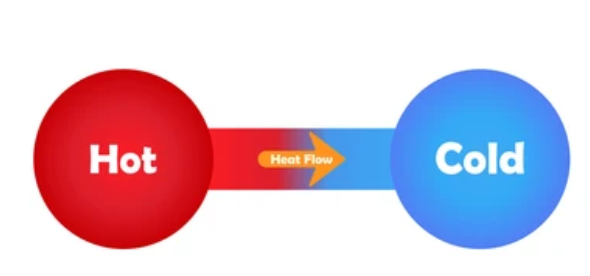
Knowing basics helps us to understand complex things. So in this article, we cover basics of Thermodynamics, which has good weightage in NEET syllabus. Mastering this chapter is a must to score good marks.
Thermodynamics is the branch of physics that studies the relationships between heat, work, and energy. It is concerned with the transfer of energy from one place to another and the transformation of energy from one form to another.
Thermodynamics is based on the fundamental laws of thermodynamics, which describe the relationships between heat, work, and energy in a closed system. A closed system is one in which energy can be transferred in and out, but matter cannot.
The first law of thermodynamics, also known as the law of energy conservation, states that energy cannot be created or destroyed, only converted from one form to another. This means that the total amount of energy in a closed system is constant, and any energy that is transferred into or out of the system must be accounted for.
The second law of thermodynamics states that the total entropy, or disorder, of a closed system will always increase over time. This means that energy tends to flow from hotter objects to cooler objects and that heat will never flow spontaneously from a cooler body to a hotter body without some kind of work being done.
The third law of thermodynamics states that as the temperature of a system approaches absolute zero, the entropy of the system approaches a minimum value. Absolute zero is the temperature at which all matter ceases to have any thermal energy, and is approximately -273.15°C.
Thermodynamics is an important branch of physics because it helps us to understand the relationships between heat, work, and energy and how they can be used to do useful work. It is also used to describe the behavior of gases and liquids, and to predict the behavior of systems in equilibrium.
Thermodynamics has many practical applications, including the design of engines, refrigerators, and air conditioners. It is also used in the study of chemical reactions, as well as in the study of biological systems and the behavior of living organisms.
One important concept in thermodynamics is the idea of a heat engine. A heat engine is a device that converts heat energy into mechanical work. The efficiency of a heat engine is the amount of work it can produce compared to the amount of heat energy it consumes. The maximum efficiency of a heat engine is limited by the second law of thermodynamics, and is known as the Carnot efficiency.
Another important concept in thermodynamics is the idea of entropy. Entropy is a measure of the disorder or randomness of a system, and is related to the number of ways in which the energy of a system can be distributed. The second law of thermodynamics states that the total entropy of a closed system will always increase over time, which means that energy tends to spread out and become more evenly distributed.
Thermodynamics is a broad and complex field, and there is much more to learn about it beyond the fundamental laws of thermodynamics. However, these laws provide a solid foundation for understanding the relationships between heat, work, and energy, and how they can be used to do useful work.
Hope this helps you a lot to understand Thermodynamics in deep. Please let us know in comments which chapter or topic from NEET syllabus you want us to cover in the next article.
PS: Want to practice questions in Thermodynamics for free? Log into NEETshala app or website and go to question bank from main menu. Select Thermodynamics from the NEET syllabus. You can practice MCQs or go through Flashcards. Click here to go to MCQs directly.